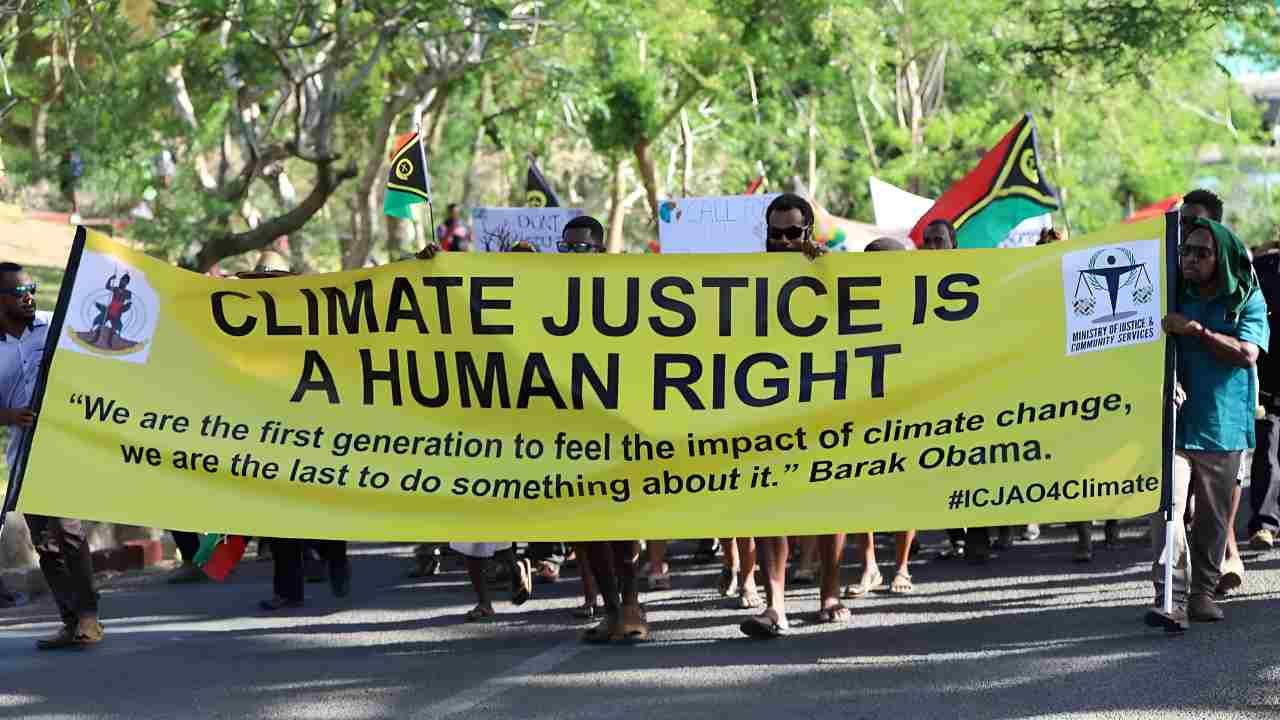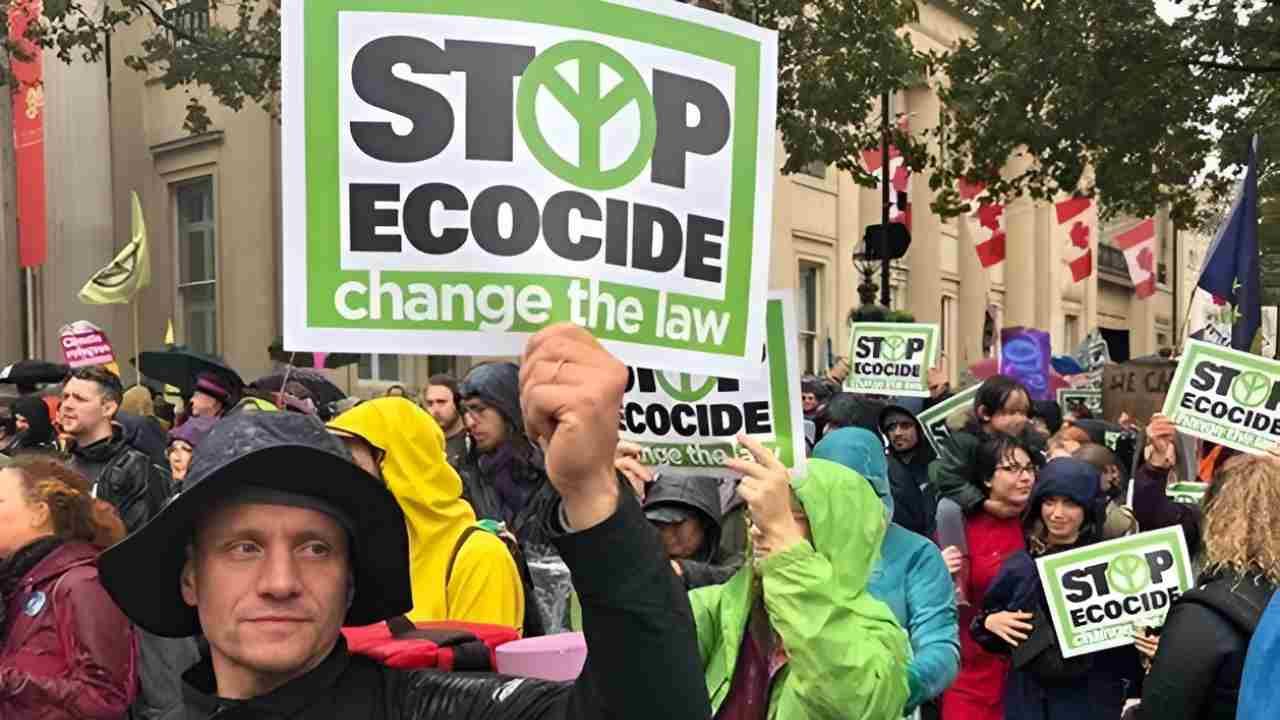

Ecocide is defined as acts of “unlawful or wanton” environmental destruction, committed in the knowledge of their likely severe, widespread or long-term effects.
Photo/supplied
Should ecocide be a global crime?
Three Pacific island countries have formally requested the International Criminal Court to recognise “ecocide,” or mass environmental destruction, as a crime alongside genocide and war crimes.
The debate on what extent environmental destruction should come within the scope of international criminal law is underway.
Advocates say international diplomacy isn’t dealing quickly or well enough with mitigating, let alone preventing, global warming.

Climate activists take their message to the streets in Vanuatu. Photo/Charley Piringi
Fed up with the lack of urgency, three Pacific island countries have formally presented a proposal to the world’s highest court this week, seeking an amendment to its principle treaty to include a crime of ecocide.
The formal proposal was submitted on Monday to the ICC Assembly's Working Group on Amendments by Vanuatu and supported by Fiji and Sāmoa urging the world's highest court to change the Rome Statute to include ecocide as a crime.
Ecocide is defined as acts of “unlawful or wanton” environmental destruction, committed in the knowledge of their likely severe, widespread, or long-term effects, according to the University of Waikato Te Whare Wānanga o Waikato.

The International Criminal Court is being urged to amend its Rome Statute to the UN and the Working Group on Amendments of the Assembly of States Parties. Photo/ICC
Its senior law professors, Leilani Tuala-Warren Dean of Te Piringa Faculty of Law, and Nathan Cooper recently co-authored a paper on the topic.
They wrote that the proposal for the ICC to recognise ecocide as a "crime against humanity" is timely and could provide a global framework of accountability for environmental damage.
"There is a long way to go before ecocide is recognised by the ICC, if it happens.
"Discussions of the proposal will likely take several years and much will depend on the level of support the proposal gains from the 124 countries party to the ICC."
The proposal stems from a long saga that has engulfed social activists, academic experts, national legislators, and international policymakers.
Fijian environment scientist Alisi Rabukawaqa-Nacewa says after decades of tireless advocacy and proliferating discussions, it’s crunch time for ecocide.
"If we first start with a definition of ecocide, it's the severe and widespread damage to the environment caused by human activity," she told Pacific Mornings' William Terite.
Watch Alisi Rabukawaqa's full interview below.
"When you think about climate change as well, and I really want to tie them both in from the start as I'm talking about it, the impacts of climate change are also that.
"In climate justice, we talk about anthropogenic climate change which is human-induced climate change.
"In both instances here, we are looking at environmental destruction caused by human activities. So that's like the common factor.
"For us in the Pacific, we have for a very long time now really talked about, expressed, and now putting into action this fight that we are the ones who are at the front lines, but we are not the ones who are causing a lot of this destruction," Rabukawaqa-Nacewa said.
Vanuatu claims it was the first country to call for the inclusion of ecocide as a crime at the ICC in 2019.
Its special envoy for climate change, Ralph Regenvanu, has also called for the international community to take the issue "seriously".
The Ni-Vanuatu anthropologist, artist, and politician turns 54 this week and says legal recognition of severe and widespread harm hold can help ensure justice and deter further destruction of the environment.

Cook Islands has welcomed the regulatory framework for deepsea mining but is against any extraction of its minerals until ‘environmentally friendly technology’ is available and Cook Islanders are fully involved. Photo/SPREP
Vanuatu has taken the lead in fighting to keep marine environment protection on the main agenda of the United Nations - the organisation responsible for developing global regulations for seabed mining.
The Jamaica-based International Seabed Authority met in July to discuss the environmental constraints on mining.
Deep-sea mineral extraction has been a contentious topic in the Pacific, where some economically-lagging island nations see it as a solution to their problems. However, many of them strongly oppose the idea.
Addressing the ISA meeting of 169 members, Regenvanu said an environmental policy was "critical", adding it was likely the authority would receive an application to approve commercial seabed mining by the end of this year.
How is this related to the petition before the ICC? There have been concerns about the damage any mining of the ocean's seafloor would have on the ecosystem.
Regenvanu and Rabukawaqa-Nacewa agree climate justice is needed to hold major emitters accountable including the destruction of the ecosystem.
"When we're talking about the destruction, we have to get into some of the details to then understand what are the implications because it could equalise large-scale deforestation, oil spills, other major pollution events, and uncontrolled release of hazardous substances into our oceans or our environment exhaust extraction," Rabukawaqa-Nacewa says.

Vanuatu Climate Minister Ralph Regenvanu, centre, explains the effects of sea-level rise on the country's coastal communities to Crown Princess Mary of Denmark during her visit in April. Photo/X
"These things can also touch on issues around nuclear waste. It can also touch on deepsea mining. And so there are multiple, you know, intersecting issues that come into play here.
"Some of these things are complex issues on their own. And then when you bring in the issue of ecocide as an international crime, it adds to the complexity of it. Sometimes, that is the deal.
"And that is just what we have to push through because if it was important that this work should have been started 25 years ago, just as well we start today. So that 25 years from now, we're in a far better place than we are right now with trying to combat these issues, right?"
Rabukawaqa-Nacewa says while this proposal to the ICC will take years to get through, "these things are difficult to do, but it's important.
"You have to table it, it goes through a review, even the process of defining what ecocide is before then, putting all these legal frameworks around it.
"I understand this because of how my work as a scientist intersects with these areas of legalities, at a local and national scale in my country and understanding how it intersects when you go into these international frameworks."
She says for the international community, this is a chance to champion a progressive legal response and show true leadership.

Photo/globalissues.org


